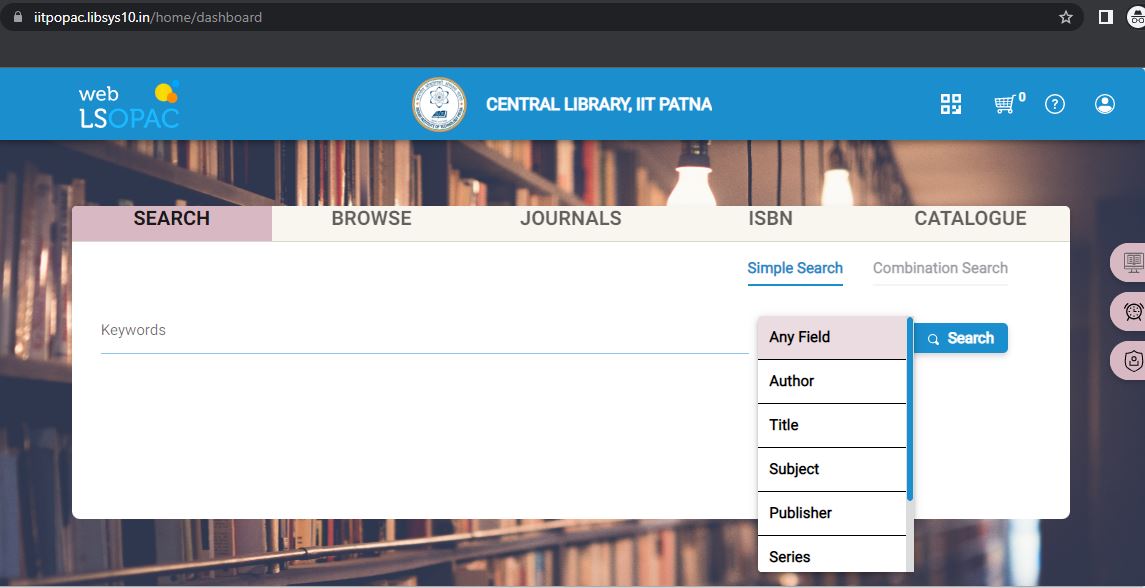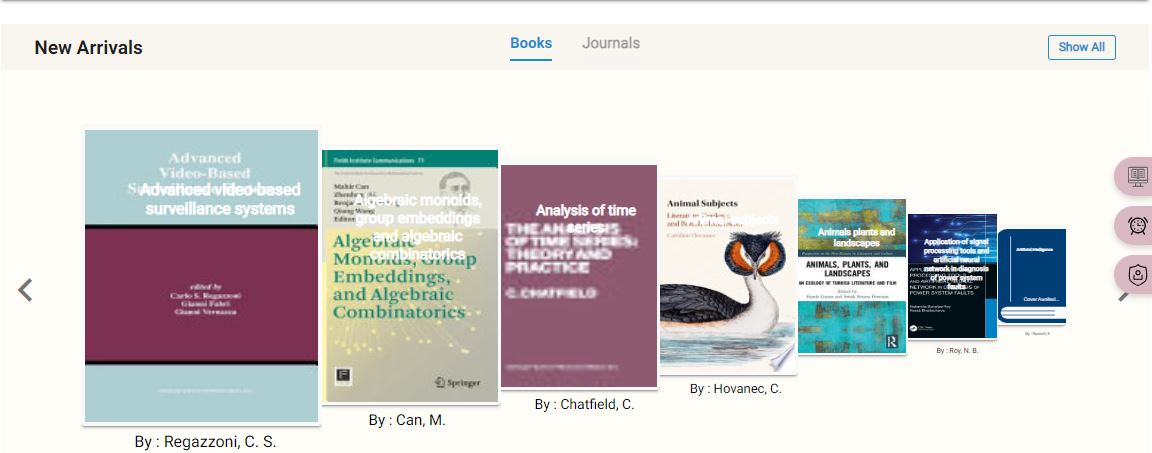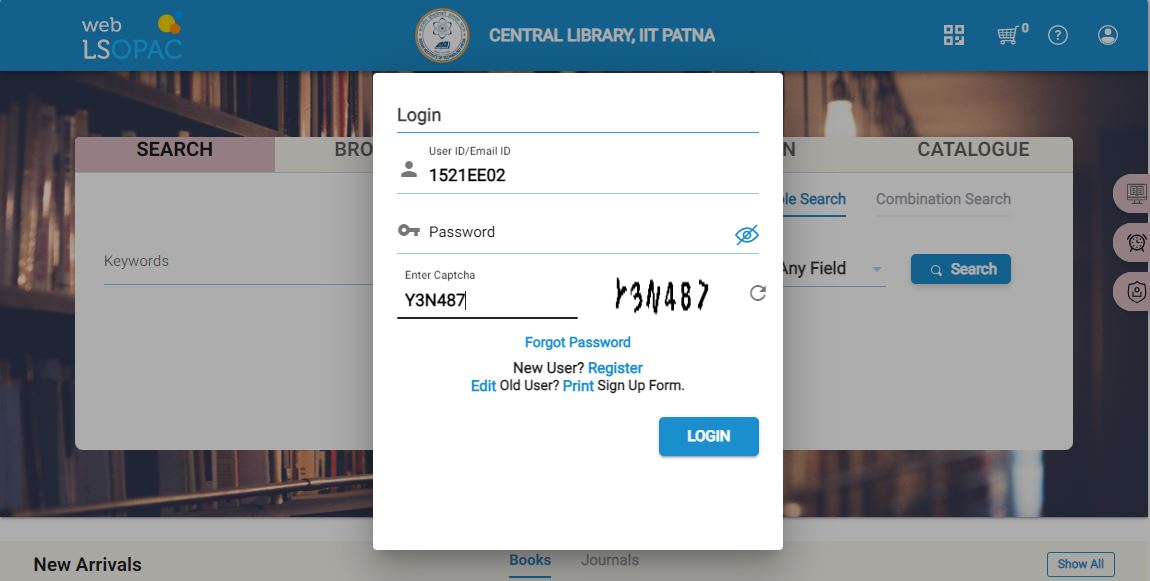- Details
- Written by Anup Das
- Category: Help Desk
- Hits: 9485
- Just click on the below Link or you can also appear through Intranet (Intranet-Facilities-Central Library and then click on Online Catalogue)
- You will appear in below window where you can search your required materials using different search facilities like simple search, advanced search, ISBN No. search and Accession No. Search.

- If you wish to see the new arrivals in the Central Library just click on the left hand side New Additions option. After clicking the option you will able to see the New Arrivals as below:

- If you wish to know your account details/Status as how many books you borrowed from library ,what is the due date of them, history etc. then just click on right side options under the my Account like Items Checked out, Reserves, Fine Logs etc,

- Details
- Written by Anup Das
- Category: Help Desk
- Hits: 12908
Assistant Librarian: Dr. Mritunjay Anand
E-mail ID: anand_m[at]iitp.ac.in
Phone:+91-6115-233052
Address: Central Library, IIT Patna
Bihta, Pin Code- 801106, Bihar
For Reader Services:
Sr. Library Info. Assistant(SLIA): Mr. Anup Das
E-mail ID: anupdas[at]iitp.ac.in
Phone: +91-6115-233787
- Details
- Written by Anup Das
- Category: Help Desk
- Hits: 11411
{slide=Q How can an outsider access the library?.|closed}
A. An individual with proper authorization letter from his/her organization/supervisor can apply to access the library for a certain period of time e.g. one week. Individual has to apply to The Library Coordinator.{/slides}
{slide=Q How can I know the availability of books in the library?.|closed}
A. Using Online Catalogue (WEB-OPAC) one can know the availability of books in the library. Else user can seek help from the Library Desk.{/slides}
{slide=Q How can I search the WEBOPAC?|closed}
A. Through ‘Simple’ and ‘Advanced’ search interface one can search the online catalogue (WEBOPAC). Please experience online catalogue here http://172.16.52.134:8380/opac{/slides}
{slide=Q How can I recognize Reserve book and Text book?|closed}
A. Reserve books are marked ‘R’ in the spine of the book along with call number. And also stamped “RESERVED” on the fore edge of the book.{/slides}
{slide=Q How long I can keep borrowed books?|closed}
|
Category |
No. of Books can Borrowed |
Duration of Loan |
|
Faculty |
10 |
Whole Semester |
|
Research Scholar |
05 |
45 Days |
|
PG Students (M. Tech/M. Sc.) |
05 |
45 Days |
|
UG Students (B.Tech) |
05 |
45 Days |
|
Staff |
02 |
30 Days |
|
Others (Project Staff) |
02 |
30 Days |
{/slides}
{slide=Q How can I renew issued books?|closed}
A. On the due date/completion of loan period individual has to bring the book to the library to renew them. User can renew by their own using the library kiosk or they can do it at the library desk.{/slides}
{slide=Q What is the procedure if I lost borrowed books?|closed}
A. Lost book should be replaced with new book or old book in good condition.{/slides}
{slide=Q How do I access the E-Resources?|closed}
A. Access to the E-Resources is prohibited outside the campus. To access the E-Resources, log in to https://elibrary.iitp.ac.in or visit Central Library for more information.{/slides}
{slide=Q I am still confused whom to contact?|closed}
A. If you are not satisfied please contact to Library Desk.{/slides}
{slide=Q What is Call Number? How can I locate a book using Call Number?|closed}
A. Central Library IIT Patna using DDC Classification scheme. This scheme organized books by subject so that all books from same subject can be organized in same place and make easy to retrieve the book on shelves.
Each book has given a unique call number according to DDC Classification scheme and books arranged over the shelves by Call Number.
Call Number: its represent subject of book and location of the book on shelf.{/slides}
{slide=Q What to do if a book is not on the shelf?|closed}
A. If book is not in expected location on shelf and also not borrowed (check out) then you may request for search to library staff. Please make sure to have author of book, title and call number. {/slides}
- Details
- Written by Anup Das
- Category: Help Desk
- Hits: 10444
It is necessary to give credit to the original author of the sources such as books, journals or web sites you use in your research work. Properly citation to the sources you can help your reader to find the actual sources again to carry their research. The key concept of citation is explained below:
What is Citation?
A Citation is a reference that allows you to admit the original source materials such as books, journal articles, speeches, websites, on-line articles, films, government publications, legal proceedings, maps and other documents related to your research.
What to Cite?
If you quote an author, even if you are only borrowing a single key word, you must refer the source.
What is not necessary to cite?
Facts that are common knowledge do not have to be cited. Citation Styles: Citation styles deviate from discipline to discipline. There are a number of different citation styles, depending on the discipline in which you are working. If you are not aware of which citation style should be used in your discipline, you should ask your Instructor/Supervisor. The following links provide guidelines to using a variety of citation styles.
BibGuru website (https://app.bibguru.com/)
- A clean and simple way to create citations
1) https://app.bibguru.com/p/347a999f-7776-4b17-85b4-3c2ed1691b09
Scribbr website (https://www.scribbr.com/)
- Citation Generator
1) https://www.scribbr.com/citation/generator/
ACS
The ACS Style Guide: Effective Communication of Scientific Information is the style manual of the American Chemical Society.
A short guide is offered by Penn State.
A brief overview from ACS (http://pubs.acs.org/page/books/index.html)
ACS (American Chemical Society) Style Guidelines Quick Guide from Berkeley (http://www.lib.berkeley.edu/CHEM/acsstyle.html).
AIP
AIP Style denotes to the citation format established by the American Institute of Physics. AIP is the format commonly used in the field of physics.
AIP style manual from the American Institute of Physics website (http://www.aip.org/pubservs/style/4thed/toc.html)
PDF form of AIP Style manual (http://www.aip.org/pubservs/style/4thed/AIP_Style_4thed.pdf)
AMS
AMS style refers to the citation format established by the American Mathematical Society.
AMS Author Resources (http://www.ams.org/publications/authors/authors)
AMS Author Handbook (ftp://ftp.ams.org/pub/author-info/documentation/handbk.pdf)
APA
The Publication Manual of the American Psychological Association is the style manual of choice for many disciplines in the social sciences. The current edition is the sixth (2009).
APA Style website (http://www.apastyle.org/)
- APA Style Blog
1) http://blog.apastyle.org/apastyle/2011/09/best-of-the-apa-style-blog-fall-2011-edition.html
2) http://blog.apastyle.org/apastyle/2010/08/best-of-the-apa-style-blog-fall-2010-edition.html
Purdue Online Writing Lab - APA (http://owl.english.purdue.edu/owl/resource/560/1/)
A sample paper is offered by Purdue University. (http://owl.english.purdue.edu/owl/resource/560/18/)
Research and Documentation Online - APA (http://bcs.bedfordstmartins.com/resdoc5e/RES5e_ch09_o.html)
ASA
The ASA Style Guide is the style manual of the American Sociological Association. It is very similar to the APA Style Manual
Cal State's ASA Style Guide is a brief guide that includes a summary of format requirements and examples of citations.
Preparation Checklist for ASA Manuscripts (PDF) from the ASA (http://www2.asanet.org/journals/asr/preplist.pdf).
Formatting in Sociology (ASA Style) from Purdue (https://owl.english.purdue.edu/owl/resource/583/01/).
ASABE
American Society of Agricultural and Biological Engineers (ASABE) styles may be used for research papers in the fields of agriculture, biochemistry, and biosystems engineering.
ASABE guide for authors (PDF) (http://www.asabe.org/media/19670/asabe_guide_for_authors.pdf#page=10)
ASME
American Society of Mechanical Engineers (ASME) style is used for submissions to ASME journals, conferences and other publications in the field of mechanical engineering.
ASME Journals Digital Submission Tool Guidelines and Information Overview of Guidelines
(http://journaltool.asme.org/Help/AuthorHelp/WebHelp/JournalsHelp.htm#Guidelines/Getting_Started.htm)
How to Submit a Paper for Publication and Format a Citation in Engineering (http://www.engrlib.uc.edu/instruction/classes/cite.html)
CHICAGO MANUAL
Chicago is the style manual of choice for history and some other disciplines.
Purdue Online Writing Lab - Chicago
(http://owl.english.purdue.edu/owl/resource/717/02/)
Research and Documentation Online - Chicago
http://bcs.bedfordstmartins.com/resdoc5e/RES5e_ch10_s1-0001.html
CSE
Council of Science Editors (CSE) style manual is referred in the field of natural sciences, including biology, geology, chemistry, mathematics, and physics.
CSE Quick Citation Guide (http://www.libraries.psu.edu/psul/lls/students/cse_citation.html)
IEEE Style
The Institute of Electrical and Electronics Engineers (IEEE) Style is basically used in engineering, electronics, telecommunications, computer science and information technology.
IEEE citation reference (http://www.ieee.org/documents/ieeecitationref.pdf)
MLA
MLA is the citation style used by most disciplines in the Humanities. MLA revised its style in 2008 in the MLA Style Manual, and these changes have been incorporated in the 7th edition of the MLA Handbook (May 2009).
Purdue Online Writing Lab - MLA (http://owl.english.purdue.edu/owl/resource/560/1/)
Research and Documentation Online - MLA (http://bcs.bedfordstmartins.com/resdoc5e/RES5e_ch08_o.html)
Beside above mentioned link you can follow this too http://howtowritecitations.com/
